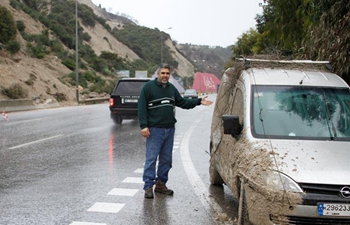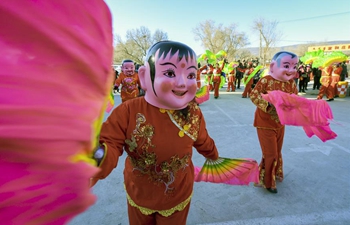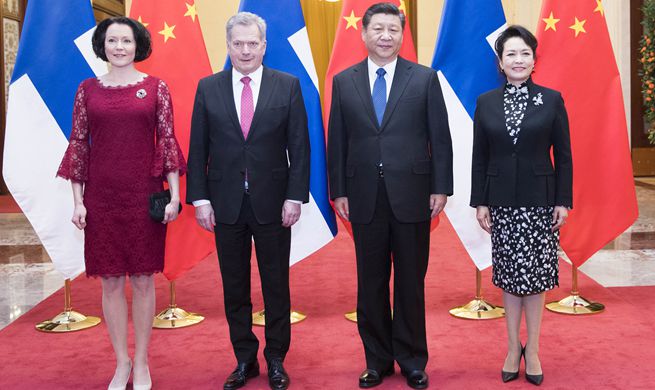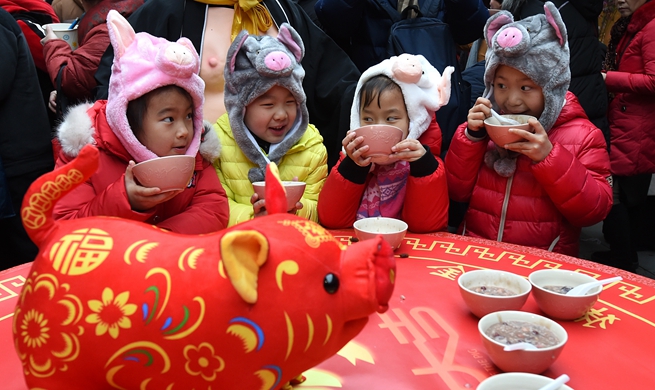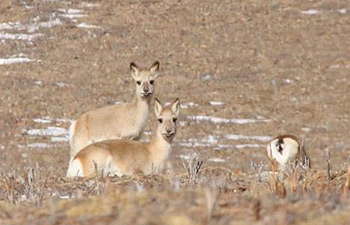TIJUANA, Mexico, Jan. 14 (Xinhua) -- Nusly Antunez is one of the migrants still at El Barretal, a nightclub-turned emergency shelter for undocumented immigrants since December in Mexico's border city of Tijuana.
The nightclub was turned into a refuge after an initial shelter had been quickly filled to capacity as successive caravans of migrants crossed Mexico in late fall to reach the U.S. border.
The only memento of the life Antunez left behind some 4,700 km away in Catacama, eastern Honduras, is a green backpack, which she considers to be a kind of lucky charm.
In October, Antunez packed her clothes in the backpack and slung it over her shoulder to join her husband Adidson Moya and hundreds of others on a caravan headed to the U.S. border.
Three months later, the 23-year-old hair stylist no longer has the clothes she lugged with her. They were stolen during the long journey through Mexico. But she has held on to the backpack just as she holds on to her hopes of securing asylum in the United States.
"It makes me angry when they tell me to throw it away. No, I am not throwing it away because I brought it from there, it's very special to me," Nusly told Xinhua as she lifted the amulet to show it better.
The migrant caravan has created a controversy in the United States, with the administration of President Donald Trump taking a harsh stance on illegal immigrants and planning to build a border wall to fend off the migrants. Embassies of the United States have also discouraged such caravans.
At its peak, the emergency shelter housed nearly 3,000 Central Americans fleeing poverty and violence. The number of migrants at the shelter have been dropping at a rate of 50 to 100 people a day. At the last weekend of December, about 1,400 migrants still slept and ate at El Barretal. Now only about 600 migrants remain.
Outside the tent where she sleeps, Nusly said she and her husband will look for work in Tijuana , which sits across the border from the U.S. city of San Diego, California, while they wait their turn to apply for asylum in the United States.
They are No. 1,746, a number she knows by heart, on the long list of would-be refugees hoping to convince U.S. immigration agents of their need for protection, in her case from drug-related crime.
"We were fleeing from the drug traffickers. They are looking to kill me and my family. My father is a drug trafficker there and they have threatened me because of him. That's the truth," she said.
"I did not want to leave my country," she added.
According to Mexico's National Coordinator of Civil Protection, David Leon, the population at El Barretal dwindled as some migrants decide to accept Mexico's offer of work. Others have opted to return to their countries, and still others to try their luck at crossing illegally.
Mexico's government offered to regularize the immigration status of Central Americans who wanted to stay and work here. Some 2,100 migrants were issued a special permit by the National Immigration Institute (INM), and another 800 are in the process of receiving it.
"I have been coming to Tijuana every week and every week I have found cases of young people who regularize their status, find a job and start working in some industry or service center," said Leon.
At the shelter, Salvadoran David Juarez said he is now working as a construction worker and plans to stay on in Tijuana. Honduran migrant Karina Vazquez is employed in cleaning but hasn't given up the idea of crossing the border.
In a separate development, Mexico's Deputy Interior Minister for Human Rights, Migration and Population Alejandro Encinas said Mexico is preparing for the expected arrival of a new caravan of undocumented Central American migrants that is scheduled to depart from Honduras on Tuesday.
But Leon said El Barretal will eventually run out of occupants and close, though there is no precise date.
"We will be very sensitive to and tolerant of the migrant phenomenon, because this administration's immigration policy is to respect, help, offer a friendly hand to our Central American brothers who migrate due to questions of poverty, of violence," he added.


